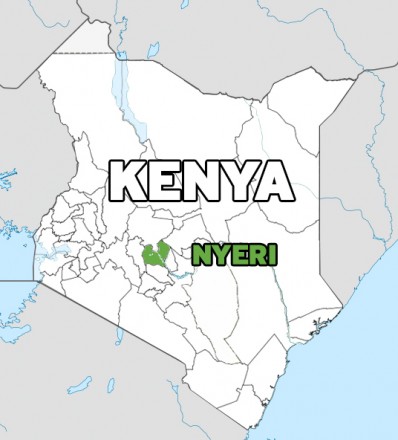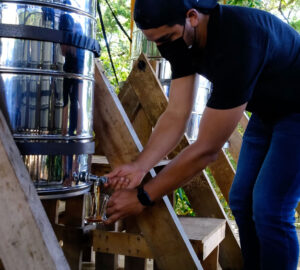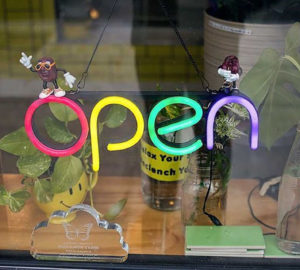As widely reported last week, all is not well for the coffee growing region of Nyeri in Kenya. Governor Nderitu Gachagua has issued an order to mill and sell all of Nyeri’s coffee in Sagana, a town in the Kiryinyaga District, effectively shutting other mills down. This raises serious questions about the potential for decreasing coffee traceability and quality in Nyeri, where some of the finest coffees in the world are grown. It also calls into question the government’s motives.
As a result, 13 co-operative societies in the region are taking the governor to court on February 10th. Mr. Gachagua’s move puts businesses like the Central Kenyan Coffee Mill (profiled here by veteran green buyer George Howell) in the crosshairs of the government, who are in the process of shutting this and other businesses like it down.
It’s been a week since our original story. Today, Dormans Coffee representative Mette-Marie Hansen updated us with news from the capitol, where the weekly Tuesday auction was cancelled.
Mette-Marie Hansen reports (emphasis ours):
It was the Millers’ and Marketing Agents’ clear and powerful message that they are totally dissatisfied with the current political interference in their business. It is estimated that in Nyeri County alone, there is up to $20 million of loans and advantages out at this time from the various Marketing Agents. There is, understandably, outrage on their part that the CBK as the regulator, is doing nothing to protect their interests.
The Central Kenya Coffee Mill (CKCM) that was forcibly closed last week, has now reopened and is receiving coffee from around the country and delivering milled coffee to the Nairobi warehouses. Nyeri coffees are still at a standstill as no movement permits are being issued by the local government. Some farmers are threatening to move the coffee bag by bag by foot, but let’s hope it doesn’t come to that.

Along with her own statement, Mette-Marie Hansen also included a statement from a cross section of Nyeri coffee millers – those responsible for sorting, separating, and storing dry coffee – as well as marketing agents, who facilitate the sale of coffees to Kenya’s exporters. This statement, from a group of millers and marketing agents in Nyeri, was sent to us as a PDF (available here) and is transcribed below:
Dated 21 Jan 2014
FARMERS TO LOSE BILLIONS FOLLOWING GOVERNORS DISRUPTION OF COFFEE MARKETING
We the undersigned Commercial coffee millers and marketing agents responsible for the milling and marketing of almost 100% of Kenyan coffee directly support any reforms in the coffee sector that will lead to increased production and quality. We have existing partnerships with all coffee growers in provision of services that include; agronomy extension services, farm input and working capital financing of 80% crop of the current crop, implementation of sustainability programs in partnership with various international organizations and governments in the coffee growing areas aimed at increasing coffee production as well as food security, milling, packaging, warehousing and marketing.
According to statistics from the International Coffee Organization, Kenya produced 767,000 bags of coffee in the year 2012/13 representing 0.53% of the total world production of over 144,611,000 bags. This level of production is insignificant in the world market, therefore, the efforts of the national and county government in partnership with the private sector must be focused firstly, on ways to reduce the high costs of production and secondly, on increasing productivity as opposed to the current effort of concentrating more in milling and marketing.
Ever since liberalization of the coffee sector through Coffee Act 2001, Coffee General Rules of 2002, and the respective amendments in 2006 and 2013 , the country has seen many coffee milling and marketing companies coming into the business. On the other hand, Kenyan Coffee as compared to other similar origins has traditionally fetched good premiums. While this is good for competition and improved service delivery to farmers, it is sad production has not grown in a similar way. if anything production has been oscillating between 34,000MT to 50,000MT in the last 10 years while milling capacity has gone up to over S00,000MT with an estimated investment of over Ksh 4 billion in these facilities.
Kenya coffee growers received USD 146 million (Ksh 12.4 Billion) in 2012/13 from sale of coffee. This income is in risk this year owing the reasons enumerated hereunder.
Recent Developments
We appreciate the Kenya Constitution 2010 proposed a raft of changes where Agriculture has been devolved to county governments awaiting legislative Acts (AFFA and Crops Act) to guide the sector going forward. It is evident that there is lack of understanding of the coffee production and trading structures. Pronouncements coming from some counties have been to say the least confounding not only to the coffee stakeholders in the country but coffee buyers around the world. Some of these unlawful pronouncements ?y in the face of new constitution. The right of association for the farmer and freedom of choice for service providers in Kenyan Coffee sector remains liberalized.
This allowed the coffee Farmer to either grow, mill or process his produce or contract a service provider of his choice but the governors now want to reverse these gains.
However, some County Governments such as Nyeri have gone ahead to force their way into the coffee milling and marketing in total disregard of existing National laws and contracts with coffee farmers (registered with Coffee Board of Kenya) as well as closing down private milling investment that they consider a threat to their plan on the milling business. Coffee Milling and Marketing contracts have over a long time been the basis through which our members have financed the farmers for working capital and inputs.
Currently our members have outstanding financial obligations of over Ksh 1.5 billion which is in risk should some of these Governors have their way. Our members will therefore be seeking legal redress including stopping the sale of any of these coffees that were used as collateral until the debts are fully paid.
We hasten to remind the county governments that their roles must remain facilitation of enabling environment for business to thrive but not compete with private sector in business. History is full of failed government funded bodies that have failed farmers in the past. In fact some farmers are yet to be paid monies owed to them when some of these bodies went under. What we see is an attempt to take coffee growers back to the same debt ridden route and this must be resisted by all progressive people who have the interest of the coffee farmer at heart.
Implications to the Sector
- Put off further funding from the private sector to the next crop that will largely lead to depressed volumes in the current production year and in the long term if the situation is not addressed.
- Deny income to around six million people who are directly or indirectly employed in the coffee sector.
- Disruption of the seamless flow of internal coffee markets thus creating uncertainty thereby hindering trade.
- Negative effect on foreign currency inflows and General Kenyan economy. In 2012/13 coffee year this amounted to USD 146 million (Ksh 12.4 billion)
- Jeopardize government policy on Private-Public investments and developments.
- Usher waves of insecurity and unrest among residents in these coffee growing areas hence increase coffee theft.
- Financial risk exposure of over US S 20 Million already advanced to farmers by private millers and Marketers.
- Spiral and uncontrollable financial defaults by coffee growers that will hit hard banks, CODF, Micro-finance institutions and Sacco’s that have already advanced money and farm inputs to growers.
- Shut down of thousands of jobs against the Jubilee Government Manifesto of creating jobs.
- Depress coffee prices at the Nairobi Coffee Exchange due to uncertainty with Coffee Farmers bound to suffer more.
The above points have created concerns of sustainability of Kenyan Coffee in the international coffee community and also doubts as to whether Kenya as an origin will honor her coffee contracts. This has led to the substitution of our coffee with other competing origins. Bearing in mind that 97% of our annual crop is consumed internationally; we have already had incidents of contract cancellation by international coffee buyers.
CCMMAA Immediate interventions
1. Considering that some counties have prevented the movement of clean coffee to the Greater Nairobi as required by the NCE trading rules, to avoid further depressing the coffee prices at the weekly auction and to safeguard the grower’s value, we have resolved to immediately postpone the Central Auction at Nairobi Coffee Exchange since continued participation in the uncertain sector can only lead to more suffering to the coffee farmer. We would not want to participate in such injustice to the farmer from whom we all depend.
2. Nyeri and Migori Governors to stop their unlawful decrees that are causing this unnecessary anxiety across the country and the coffee world.
3. The leadership of the ministry of Agriculture through Coffee Board of Kenya to enforce the rule of law in totality for existing milling and marketing contracts to be adhered to without interference.
4. Coffee Board of Kenya to publicly gazette and publish already signed contracts under their custodian for general consumption and denounce any duplicate contracts illegally signed under duress by said governors.
5. Those who have contravened the law in coffee dealings to be prosecuted forthwith.
6. The National government to intervene and assure both local and international stakeholders continuity of coffee business in Kenya.
7. We as the legitimate Commercial Mills and Marketing Agents in the Republic of Kenya will immediately initiate a legal action to recover all monetary and farm input advances with extra costs in damages due to breach of existing contracts.
We caution that failure by National Government to offer immediate solution of the said issues, Kenyan Coffee growers will be fleeced by the said Governors and other persons with similar vested interests in disguise of help for political and personal goals rather than for public good.
Signed By
Tropical Farm Management (K) Ltd
Oaklands Coffee Marketing Co Ltd
Sustainable Management Services Ltd
Central Kenya Coffee Mill Ltd
Sasini Ltd
Highlands Coffee Company Ltd
Aristocrats Coffee and Tea
Nyambene Coffee Mills
NKG Coffee Mills (K) Ltd
Kofinaf Co. Ltd
Coffee Management Services Ltd
Nyambene Coffee Estates
Watch Sprudge for more updates. This story out of Nyeri is developing…


































